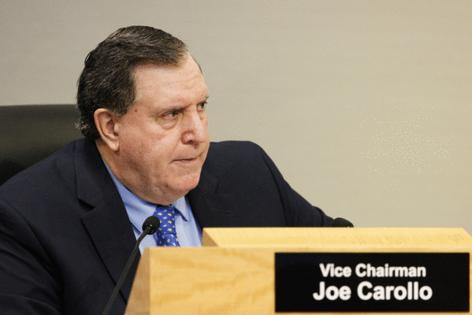US district judge rules that Joe Carollo can protect Coconut Grove home from seizure
Published in News & Features
MIAMI — U.S. District Court Judge Rodney Smith has ruled that Miami City Commissioner Joe Carollo can protect his Coconut Grove home from seizure, blocking an effort by Little Havana businessmen Bill Fuller and Martin Pinilla to collect on a $63.5 million judgment they were awarded last year after a jury found that they were victims of a political retaliation campaign pushed by Carollo.
The order lands more than nine months after the U.S. Marshals Service posted a notice on the front gate of Carollo’s property, initiating the process of seizing the 5,243-square-foot residence. Valued at $2.5 million, the house is the single largest asset for Carollo, who earlier this summer reported having a net worth of negative $63.9 million in light of the judgment.
Carollo’s legal team challenged the attempted seizure, arguing that the home is his legal homestead under a state constitutional provision that protects such properties from being seized to pay a legal judgment. Carollo purchased the home in 2001 but moved out in 2016 when he ran for the District 3 seat — a move that allowed him to meet the residency requirements for running for office in that district because, at the time, the Coconut Grove home was located in Miami’s District 2.
Carollo then moved back into the Coconut Grove home in April of 2023, days before the trial in the civil rights case began. At that point in time, Carollo’s home had been redrawn into District 3 during the redistricting process the year prior.
Attorneys for Fuller and Pinilla had alleged that Carollo altered the city’s voting map so the Coconut Grove home was drawn back into District 3, arguing that the homestead exemption does not apply to Carollo because of his “fraudulent and egregious manipulating” of the city’s voting maps. They wrote in a court filing that the commissioner’s actions in the redistricting matter were “aimed solely and exclusively at putting him in a position [to] move back into a property on Morris Lane that he had abandoned years earlier with the sole purpose of protecting that property from judgment creditors.”
In July, a magistrate judge ruled in Carollo’s favor, allowing him to protect his home from seizure under the homestead exemption. Her order then went before Judge Smith, who upheld those recommendations in his ruling Tuesday.
Smith wrote that the plaintiffs failed to establish that the redrawn voting map that added Carollo’s home into District 3 was the result of misconduct by Carollo.
Smith added that “even if [Carollo] had abandoned the Property as his homestead, the evidence showed that he reestablished his homestead in April 2023. ... In fact, his driver’s license and voter registration list the Property as his residence, as do his 2022 and 2023 tax returns and bank statements.”
In a statement on Wednesday, Carollo’s legal team wrote that Smith’s ruling shows that Florida’s constitutional homestead exemption “remains a vital guarantee against predatory creditors.”
“Miami Commissioner Joe Carollo and his family are thrilled that the federal court validated his Constitutional Homestead as a protection against the efforts of local businessmen to take away his only home,” the statement said. “The federal court flatly rejected the Plaintiffs’ attempt to rewrite new and unfounded exceptions to Florida’s Constitutional Homestead Protection, the very bedrock of Florida’s guarantee of home ownership.”
Attorney Jeff Gutchess, who represents the plaintiffs, said the issue should go before the Florida Supreme Court.
“Here, we have a public official who famously abandoned his homestead in Coconut Grove to run for commissioner in Little Havana, where he then abused his governmental power to chill the free speech rights of the local businesses,” Gutchess said in a statement Wednesday.
“We believe the Florida Supreme Court will agree that such conduct is egregious and voids any homestead protection,” Gutchess added.
Gutchess said the next step is to file an appeal to the Eleventh Circuit Court of Appeals, which would then decide if it should go before the state Supreme Court.
©2024 Miami Herald. Visit at miamiherald.com. Distributed by Tribune Content Agency, LLC.







Comments